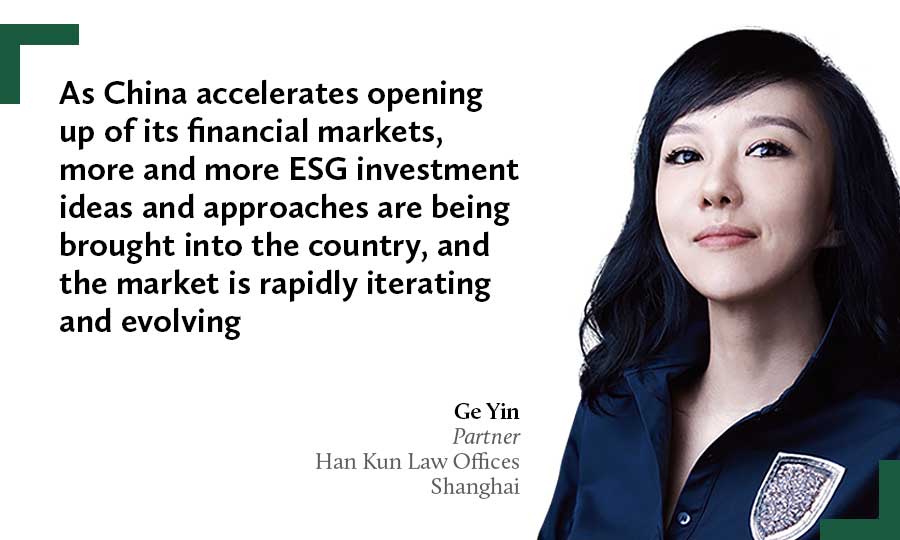Although belated, an unstoppable green investment push and an evolving regulatory framework are prompting companies in China to catch up and take action. Luna Jin reports
IF YOU ARE STILL BIDING your time with environmental and social governance (ESG) strategies, or executing them as mere formalities in China, think twice.
In about 10 short years, the mentality of many pioneering businesses around the world has experienced a dramatic change from “make my business bigger first, then I’ll take care of these issues” to “what I can do to help in my day-to-day business”.
Unlike developed markets, ESG practice in China has largely been driven by top-down policies. The country has been continually formulating and implementing policies towards international standards since 2012. For business entities, this means sustainability reporting will likely soon shift from voluntary to mandatory.
Although these changes may seem late compared to the EU, US and other jurisdictions, once set in motion they will transform business decision-making and challenge the well-known Milton Friedman doctrine that a company’s sole responsibility is to make money for its shareholders. Instead, the focus will shift to a broader consideration of “stakeholders”.
Fuelling the irreversible trend, ESG investment is on the rise as capitalism reinvents itself and the world gradually wakes up from the fairy tales of eternal economic growth.
Positioned at the intersection of legal, compliance and risk management, the general counsel is well aware that the added legal function is not just another hat that falls onto the legal department.
With surging legal demand helping companies navigate ESG transitions, leading law firms in China are seeing great potential and building dedicated ESG service teams.
At the forefront of China’s experimentation of financial reform, Hong Kong has recently lined up its ESG regulatory requirements upgrade. As part of its efforts to maintain its status as a sustainable and environmentally friendly financial hub, the HKEX is preparing to enforce mandatory climate-related disclosures by all listed companies.
The bourse initiated a three-month consultation in April 2023 regarding the proposed plan – the Enhancement of Climate-related Disclosure under the Environmental, Social and Governance Framework – which is expected to be more rigorous and comprehensive than the HKEX’s current “comply or explain” regime, which requires companies to either disclose or justify their lack of disclosure.
GREEN FINANCIAL PUSH
To honour the political commitment of “peaking carbon emissions by 2030” and “achieving carbon neutral by 2060”, the central government has imposed a series of green finance policies.
As early as 2012, the former China Banking Regulatory Commission issued Green Credit Guidelines, which mandated banking and financial institutions to take the initiative to promote green credit and increase their support for the growth of green, low-carbon and circular economies.
In 2018, the People’s Bank of China, along with the China Banking and Insurance Regulatory Commission (CBIRC), the China Securities Regulatory Commission, the National Development and Reform Commission, and the Ministry of Finance, jointly issued a series of documents, including the Opinions on Further Deepening Financial Services for Small and Micro Enterprises. This directive urged financial institutions to increase their investments in key economic and social areas, as well as address weak links such as small and micro enterprises.
Four years later, the CBIRC introduced the Green Finance Guidelines for the Banking and Insurance Industry, requiring bancassurance institutions to promote green finance at a strategic level. For the first time, the guidelines proposed the incorporation of ESG requirements into the management processes and comprehensive risk management systems of these institutions.
This has been followed by various industry associations issuing self-regulatory rules in succession, and stock exchanges and the National Association of Financial Market Institutional Investors clarifying the definition and issuance requirements of green bonds.
The Asset Management Association of China (AMAC) published the Green Investment Guidelines (For Trial Implementation) in 2018. These guidelines defined the meaning of green investment, encouraged the fund industry to develop green investments, and provided guidance to fund managers on using published green criteria to screen investment targets for green investments.
A year later, the China Trustee Association announced the Green Trust Guidelines, which encourage trust companies to develop green trusts and require them to follow publicly available green criteria when selecting investment targets for such trusts.
“By imposing green finance business requirements on financial institutions, it will reverse the process of promoting and monitoring ESG cultural construction and fulfilment of ESG commitments by enterprises with financing needs,” says Damon Quan, a Shanghai-based partner at Han Kun Law Offices.

Impacted by both international practices and the nationwide domestic rallying cry of green finance, the number of ESG funds in China doubled in 2021, according to public data.
You must be a
subscribersubscribersubscribersubscriber
to read this content, please
subscribesubscribesubscribesubscribe
today.
For group subscribers, please click here to access.
Interested in group subscription? Please contact us.




























